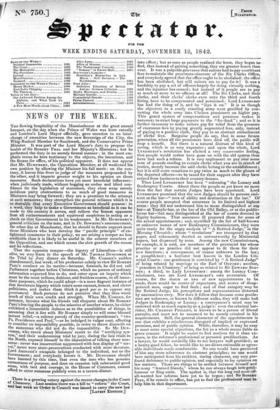' There is avowing outcry against the recent changes in
the Court of Chancery. Last session there was a bill to " reform " the Court, and last week an Order in Council was issued to carry the new law into effect ; but as soon as people realized the boon, they began to- find, that instead of gaining something, they are greater losers than ever. It was a palpable grievance that suitors had to pay exorbitant fees to maintain the proximate-sinecure of the Six Clerks Office, and everybody agreed that the office ought to be abolished: the office has been abolished, but still suitors are to pay for it! It was a hardship to pay a set of officers largely for doing virtually nothing, and the injustice has ceased ; but instead of it people are to pay as much or more to no officers at all! The Six Clerks, and their clerks, and their clerks' clerks even unto the third and fourth hiring, have to be compensated and pensioned : Lord LYNDHURST has had the doing of it, and he "lays it on." It is as though the objectors to a costly standing army were gratified by con- verting the whole army into Chelsea pensioners on higher pay. This grand system of compensations and pensions makes it necessary to exact large payments to the "fee-fund"; and so it is further necessary to make suitors pay for relief from the pressure of enormous fees by paying greatly augmented fees, only, instead of paying to a positive clerk, they pay to an abstract embodiment of clerks' fees. Sanguine people do say, that in some thture generation, when all the pensioners have died off, the public will reap a benefit. But there is a natural distrust of this kind of saving, which is so very expensive ; and upon the whole, Lord LYNDHURST'S revolution has elicited a very conservative feeling, that people would rather have gone on with the old system than have had such a reform. It is very unpleasant.to pay over some tens of pounds sterling to certain clerks when you are in search of justice, merely because the said clerks belong to the establishment ; but it is still more vexatious to pay twice as much to the ghosts of the departed officers—to be taxed for their support after they have retired from business to their country-houses. Then Lord LYNDHURST has been " reforming" the Lunacy and Bankruptcy Courts. About them the people as yet know no more than the fact that certain Judges have been appointed., Lord LYNDHURST promised that the new Judges should be persons emi- nent at the bar—" men of ability and deatinction at the bar." Of course people accepted that assurance in its limited and highest sense : they did not understand him to mean distinguished at any • bar-at Temple-bar, at the bar of the Old Bailey, or at the public- house bar=but men distinguished at the bar of courts devoted to Equity business. That assurance ill prepared them for some of the actual appointments ; and, mystified by the list of half-known or unknown names of new Bankruptcy Commissioners, they were quite ready for the angry analysis of " A Retired Judge," in the Morning Chronicle; whose " revelations" are trumpeted by that paper, and vehemently decried as untrustworthy by Ministerial papers, but disproved by none. Among the new Commissioners, for example, it is said, are members of the provincial bar whose practice or no practice did not appear to fit them for their new functions ; a conveyancer, of course unknown to the bar; a pamphleteer; a barrister best known in the London Cri- minal Courts : one gentleman is convicted by " A Retired Judge" of being related by marriage to the Earl of ORFORD; another, " penniless in Chancery," of being so related to Sir EDWARD SIM.. DEN ; a third, to Lady LYNDHURST: among the Lunacy Com- missioners, two are Lord LYNDHURST'S own secretaries. Of course, for the dozen or two of new appointments to be made, there would be scores of expectants, and scores of disap-
pointed men, eager to find fault ; and of that category may be
the Retired Judge, his perceptions and representations distorted by unconscious envy. Nor does it follow that because some gentle-
men are unknown, or known in different walks, they will make bad Judges in Bankruptcy or Lunacy : a conveyancer's mind may be endowed with as much capacity as a judge's: even the criminal bar-
rister, Mr. CHARLES Putman, is known to be a person of liberal
pursuits, and must not be assumed to be merely criminal in his acquirements. Still, the general character of the appointments is one that exhibits a mischievous disregard of implied or expressed promises, and of public opinion. While, therefore, it may be easy to meet some special objections, the list as a whole seems liable to grave censure. It might be easier to find motives for it than ex- cuses, in the reformer's professional or personal predilections. As a lawyer, he would naturally like to see lawyers well provided ; as a hearty good fellow, he would like to see divers estimable or agree- able individuals made comfortable. No one would have predicted of him any stern adherence to abstract principles; no one would
have anticipated from his reckless, daring character, any very pro- found deference to public opinion, and especially to lay opinions on law matters. Those are things to be settled between himself and his many " learned friends," whom he can always laugh into good- humour or fling aside. The upshot is, that the long and most-of- all-wanted law reforms have yet to be begun ; and Sir Romurr PEEL, if he remain in office, has yet to find the professional tO help him in that department.


























